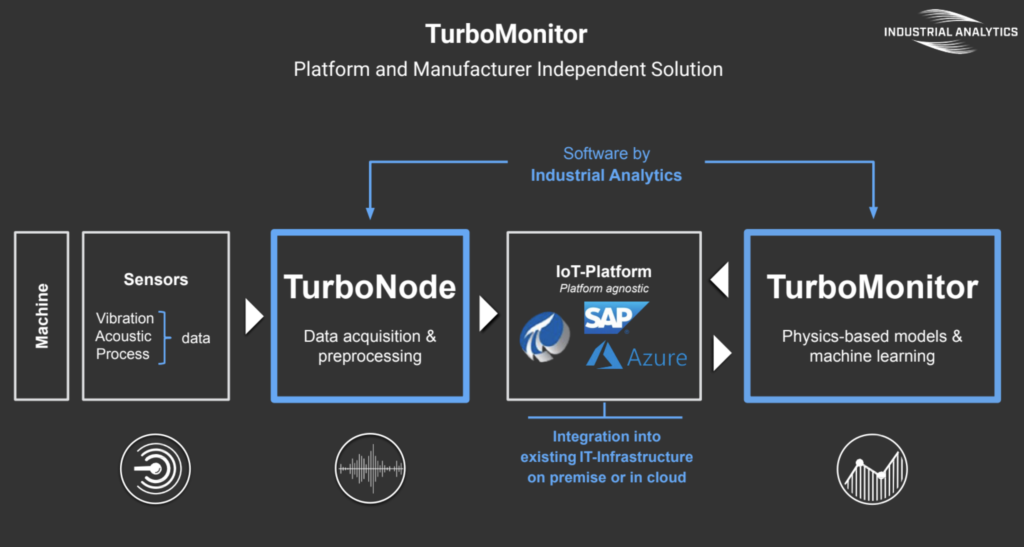More intelligent monitoring of production plants with AI
Judith Hillen
The use of artificial intelligence has also reached the production facilities of pharmaceutical and chemical companies. The Berlin-based startup Industrial Analytics has developed a solution for better monitoring of industrial plants: Physical models in combination with AI make it possible, for example, to detect malfunctions at an early stage and thus carry out precisely tailored maintenance. In an interview with 5-HT, co-founder and Managing Director Anja Vedder and Technical Sales Manager Marc Vollmer explain how the Industrial Analytics solution works and what makes it different from other systems.
 Managing Director Anja Vedder and Technical Sales Manager Marc Vollmer
Managing Director Anja Vedder and Technical Sales Manager Marc VollmerIn short, what does Industrial Analytics do?
Marc Vollmer: We move in the area of digitalization, machine learning and Internet of Things. Industrial Analytics implements digital high-tech products to monitor complex industrial plants easily and reliably. We identify potential for greater efficiency, for example by enabling predictive, condition-based maintenance.
Why is condition-based monitoring of plants so important?
Marc Vollmer: Status-based monitoring allows the user to detect new, previously hidden potential. In concrete terms, for example, plant processes can be optimized so that a higher output is achieved with the same input. Root cause analyses make it easier to find the causes of malfunctions. In addition, anomalies can be detected in time. For example, maintenance cycles can be designed dynamically, which drastically reduces maintenance costs. At the same time, this increases plant availability.
For which plants and industries is the system suitable?
Marc Vollmer: Our solution is suitable for large-scale industrial plants, such as those found in refinery processes or in power and heat generation. Customers are typically operators of such plants, service providers and OEMs who provide the plant components. The customer base covers the oil & gas, energy & utilities, but also aviation and shipping industries. Our solution can also be used well in the chemical and pharmaceutical industries.
To what extent can your software be relevant for pharmaceutical and chemical companies?
Marc Vollmer: Every pharmaceutical and chemical company is equipped with a large number of machines and plants. Turbomachines such as turbines and compressors, for which we have special expertise, are often the heart of the production processes. For Evonik, for example, we built a Polymer Performance Predictor (PolyPeP) for the Ruhr Data Challenge 2019: We developed an algorithm for this that is capable of determining the optimum composition of lubricants. We are currently working with another large company on a digitization project to discover new potential in the area of maintenance.
How does your software work?
Marc Vollmer: The software uses physical and process-based models of the plants to simulate their behavior. These models are trained using Artificial Intelligence and are constantly learning as new situations arise. The real status of the plants is continuously recorded by various sensors. This enables us to recognize if the real state develops differently than would be expected according to the calculations of the models. This allows us to detect possible faults at an early stage and proactively provide concrete instructions for action.

How does the software differ from other existing solutions for monitoring machines and plants?
Anja Vedder: First of all, some companies currently have no monitoring system at all. If a system breaks down, then it breaks down, and only then do you deal with the problem. That costs a lot of time and money. Those companies that already use monitoring systems today often use solutions that date back to the 1980s. User experience or intelligent interfaces were not an issue back then, and false alarms were often the result. The providers on the market today often offer purely statistical, data-based solutions without a holistic approach. We differ from them in our high level of technical expertise - with experts in AI, vibration analysis, rotor dynamics, sensor technology and signal processing. Our founding team has worked for many years with an OEM that manufactures the machines we deal with, so we have a deep understanding of our customers' equipment. In addition, we are now OEM-independent suppliers, and our solution can be integrated very flexibly into customer-specific systems. We work closely with our customers because we know that there can be barriers to entry when it comes to digitalization.
How did it come to the foundation of Industrial Analytics?
Anja Vedder: Industrial Analytics was founded in November 2017. The team of six founders had previously worked for many years for a renowned turbomachinery manufacturer in the industry. However, due to a lack of agility and commitment within the Group, digitization issues could not be pursued there to the necessary extent. Due to the great demand and the desire of customers for an independent partner, the decision was made to found an own company.
What is the current status of developments?
Anja Vedder: We successfully closed a financing round last year and are now in a position to grow further and expand our operating business. In the last three months, we have been able to recruit many employees who we were able to integrate productively very quickly. In terms of research and development, we continue to be very active in terms of research projects and co-innovation. Currently, we are dealing with the trendy topic of fleet management, among other things, which is particularly relevant for companies that have a wide range of plants, possibly spread over several locations. This requires particularly good monitoring. We are therefore working on a solution that provides an overview of such a variety of plants and locations.
What are your next targets?
Anja Vedder: We want to further strengthen our position in the DACH region, further expand our network and win new customers in order to achieve sustainable growth. At the same time, we are always ready to take on new challenges. Hopefully in five years we will have expanded successfully in the European market and have relevant partners in the Middle East and Asia who will help us to further increase our brand awareness and market share.
How did you come to the 5-HT Network and what do you expect from it?
Marc Vollmer: The contact was established through Dieter Büttenbender , who is a mentor in the network and the 5-HT X-linker startup program. After our telephone conversation with Frank Funke, we are now part of the network and have already been able to make important contacts with companies at this year's 5-HT X-linker. We are very curious to see how this will develop and are looking forward to the coming innovative pilot projects.
5-HT Chemistry & Health Newsletter
Want the latest tech and industry news, events, relevant info from the ecosystem and more?
Subscribe to 5-HT Newsletter now Subscribe to 5-HT Newsletter now
Become part of the 5-HT Chemistry & Health
Exchange ideas with innovative startups and future-oriented companies in our ecosystem. We look forward to meeting you!